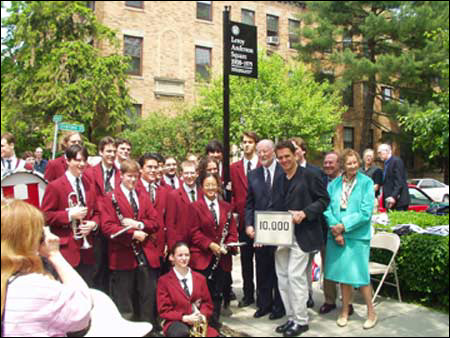Leroy Anderson Square dedicated:
Composer of ‘Sleighride’ and ‘The Syncopated Clock’ honored by Cambridge

You know his music even if you don’t know his name – the sprightly “Sleighride,” inescapable at Christmastime; “The Syncopated Clock,” heard for 25 years as the theme of New York’s “Late Show”; “The Typewriter,” featuring a solo instrument more common in the office than the concert hall; the million-selling “Blue Tango”; “Jazz Pizzicato”; “A Trumpeter’s Lullaby,” and many more.
Leroy Anderson, one of the most frequently played American composers in the world, became part of Cambridge geography on May 31 when a square at the corner of Chatham and Crawford streets was dedicated to him. The son of Swedish immigrants, Anderson grew up in a house at 12 Chatham St., attended Cambridge High and Latin School (now Cambridge Rindge and Latin), and Harvard University (Class of 1929).
He went on to earn an M.A. in music from Harvard in 1930, then began a Ph.D. program, not in music but languages. It was while he was a graduate student that he became director of the Harvard Band. His inventive arrangements of Harvard classics, still being played to this day, brought him to the attention of Arthur Fiedler, legendary director of the Boston Pops.
The Pops debuted most of Anderson’s orchestral miniatures as well as his longer works, and his relationship with the orchestra continued until his death in 1975.
On hand at the dedication ceremony to pay tribute to that partnership were the Pops’ current conductor, Keith Lockhart, and Laureate Conductor John Williams, each of whom spoke briefly. Also present were Cambridge Mayor Michael A. Sullivan, Anderson’s widow Eleanor Firke Anderson, and the composer’s three grandsons.
Lockhart called Anderson “a crossover composer before anyone came up with the term. The voice of Leroy Anderson became the voice of the Boston Pops in its dual commitment to approachability and to excellence.”
Williams spoke of Anderson a “an American original – direct, honest, personal, idiosyncratic, and free of pretension. His music is directed to, and reflective of, the American soul.”
The Harvard Band, conducted by Tom Everett, director, played a medley of Anderson favorites, and, following the unveiling of the plaque, segued into Anderson’s arrangements of Harvard songs, including “Ten Thousand Men of Harvard.”




